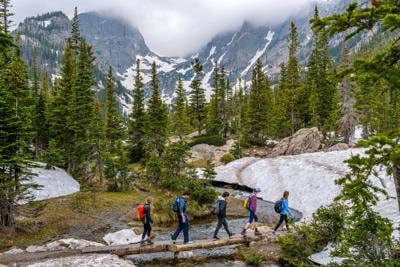Altitude sickness is a term that gets tossed at visitors coming to Colorado quite a bit. It’s often known to be a cause for concern, but there are a few additional things that need to be known about the condition. This way, preventing it and identifying the symptoms will be easier for tourists and residents, alike.
*While we tried to pull in as much doctor-reviewed information as possible, this blog post should not be considered official medical advice. Check with your doctor before heading to higher altitudes. Altitude sickness can be severe and should always be taken seriously.
1. Altitude sickness is caused by operating at high altitudes.
When you’re at a high altitude, there’s reduced air pressure and a lower level of oxygen in the air. This can result in a condition known as “altitude sickness,” which often first shows in symptoms like tiredness, headaches, loss of appetite, nausea, and shortness of breathe. Most sources agree that these symptoms generally start to show at altitudes above 8,000 feet, though this tends to vary with each individual.
2. Altitude sickness CAN kill you.
This is one reason why altitude sickness should be taken very seriously – the symptoms can be deadly. In one recent instance, a woman died on the Conundrum Hot Springs trail from High Altitude Pulmonary Edema (HAPE) and High Altitude Cerebral Edema (HACE), two effects of operating at a higher altitude.
3. Altitude sickness can effect ANYONE.
While altitude sickness tends to be most noticeable in visitors to a high-altitude area, one high-country doctor is on a mission to spread the word that even long-term residents of high-altitude towns can fall victim to the condition. That being said, certain groups are considered to be at higher risk, including: those coming from sea-level or near it, those that have had altitude sickness before, those ascending quickly, and those with certain medical issues involving the lungs, heart, and nervous system.
4. Symptoms can easily be MISDIAGNOSED.
With symptoms like fatigue, headaches, respiratory issues, and congestion, it’s easy to misdiagnose altitude sickness, thinking that it’s something else. Two things it can often get mistaken for are pneumonia and asthma.
5. You can take PREVENTATIVE steps.
According to one doctor-reviewed article, five steps can help you prevent altitude sickness. These include (1) delaying exercise for the first few days at altitude, (2) avoiding alcohol for the first couple days at altitude, (3) sleeping at a lower altitude, (4) if recommended by your doctor, taking medications like acetazolamide to help the body adjust, (5) and ascending into higher altitude at a slow rate, preferably not more than 1,000 feet a day. It’s also crucial to stay hydrated and to prepare for a high-altitude trip by hydrating for several days leading up to the travel.
6. When you notice the symptoms, TAKE ACTION.
The quickest response to altitude sickness should be immediate descent to a lower altitude. This can often relieve mild symptoms. Oxygen supplementation is another treatment option. If you’re new to a high altitude area, it’s never a bad idea to buy a portable can of oxygen – just in case (there is some debate about the effectiveness of portable oxygen). Additionally, medicines like dexamethasone and acetazolamide can be used, though you should always check with a doctor first.
*While we tried to pull in as much doctor-reviewed information as possible, this blog post should not be considered official medical advice. Check with your doctor before heading to higher altitudes. Altitude sickness can be severe and should always be taken seriously.







(0) comments
Welcome to the discussion.
Log In
Keep it Clean. Please avoid obscene, vulgar, lewd, racist or sexually-oriented language.
PLEASE TURN OFF YOUR CAPS LOCK.
Don't Threaten. Threats of harming another person will not be tolerated.
Be Truthful. Don't knowingly lie about anyone or anything.
Be Nice. No racism, sexism or any sort of -ism that is degrading to another person.
Be Proactive. Use the 'Report' link on each comment to let us know of abusive posts.
Share with Us. We'd love to hear eyewitness accounts, the history behind an article.